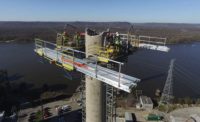The Israeli government says it will draw up a plan for massive infrastructure investment over the next ten years, with economists warning that its significant lag behind other developed countries hampers economic development.
A recent study by an Israel think tank, the Aaron Institute of Economic Policy at the Inter Disciplinary Center, estimated the gap at as much as $170 billion. The funding is expected to come from foreign sources in the form of public-private partnership deals, and only partially from the state budget.
"Israel is in a unique position in that it has a growing population, a very low budget deficit and a high international credit rating, making it attractive for foreign investors and companies looking for infrastructure opportunities," said Chen Herzog, chief economist and infrastructure expert at BDO Consulting. He added that there has been a growing wave of interest in Israeli infrastructure projects.
The committee, which will be made up of senior officials from the Transport, Energy, Water Resources and National Infrastructure and Finance ministries, is due to present initial recommendations in December along with a project priority list.
Over half the proposed infrastructure investment is expected to be in transportation. Israel is facing some of the worst traffic congestion in the western world, coupled with a low level of public transit options.
Projects expected to get a huge boost include a massive investment in the country's already expanding rail network; light-rail and subway networks in the Tel Aviv, Jerusalem, Haifa and Beer-Sheba metro areas; a light-rail line between Haifa and Nazareth; and even a proposed cable car between the lower part of Haifa and the upper part of the city, where the Technion-Israel Institute of Technology and Haifa University are located.
At present, Jerusalem has one light-rail line and has approved a second; construction is underway on Tel Aviv's first line, and several others have received initial approval.
In addition, there are also plans for construction of new highways to ease congestion.


Post a comment to this article
Report Abusive Comment